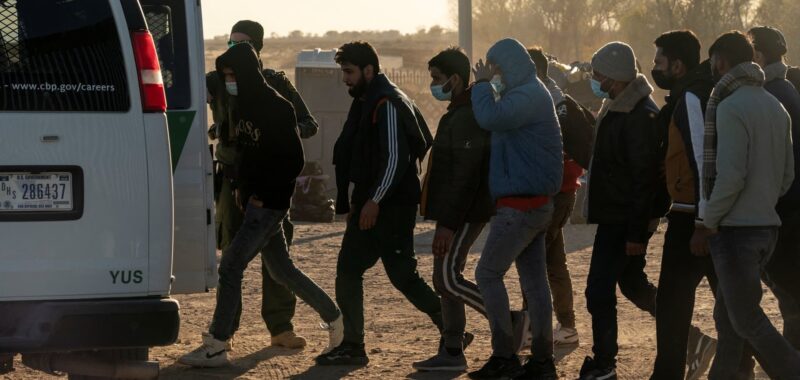
PHOENIX — Immigration is a top election issue across the country, but few places feel it more than Arizona, the only swing state along the southern border and home to one of the races that could make or break control of the Senate.
Arizona businesses say a shortage of workers is threatening to hold up projects in industries such as construction, hospitality and agriculture — and that without changes to the federal immigration system, the economy could face a devastating hit.
About 16.2% of Arizona’s workforce is made up of immigrants, according to a 2022 study by the American Immigration Council. Meanwhile, the state is also facing a job shortage, 197,000 as of June, according to the Bureau of Labor Statistics.
Monica Villalobos, the president and CEO of the Arizona Hispanic Chamber of Commerce, said the lack of labor is leading to larger economic impacts, such as on housing prices.
We have several members that are in the construction industry that aren’t able to find workers to complete projects,” she said. “And when they can’t complete projects, that means there is a lack of housing.”
Immigration has also been in the spotlight in the competitive Senate race between Democratic Rep. Ruben Gallego and Republican Kari Lake, a former news anchor and the 2022 Republican nominee for Arizona governor. The race is to fill the seat being left by Sen. Kyrsten Sinema, an independent.
Arizona Democratic Senate candidate U.S. Rep. Ruben Gallego speaks during a press conference about the Arizona-Mexico border at the Santa Cruz County Sheriff’s Department in Nogales, Arizona, March 18, 2024.
Rebecca Noble | Reuters
While Congress has struggled to pass immigration reforms, Sinema and a bipartisan group of senators did produce a bill that, among other things, would have greatly expanded worker permits to immigrants. Political pressure ultimately caused the bill to fail on a procedural vote.
Michael Infanzon, a lobbyist with the Canyon State Business Alliance, said the current legal immigration system is an “absolute fiasco” both for businesses needing employees and for workers.
“Imagine if you wanted to go from Maryland to Virginia, and it took you three years to get the paperwork to go from Maryland to Virginia to work for six months,” he told CNBC in an interview. “Are you going to continue to do that, or are you going to hop the border to do it and then go back?”
Gallego said he supports the bipartisan legislation. He has also called for adding more Border Patrol agents and making cross-border trade more efficient.
I have been laser-focused on ensuring our Ports of Entry have the advanced technology and manpower to handle the cross-border trade that our country relies on,” he said in a statement to CNBC.
Arizona Attorney General candidate Abe Hamadeh, Arizona Republican Senate candidate Blake Masters, Republican gubernatorial candidate Kari Lake and Secretary of State candidate Mark Finchem hold a press conference as they tour the Arizona-Mexico border area, Nov. 4, 2022.
Kevin Dietsch | Getty Images
Lake is a strong supporter of Republican presidential nominee former President Donald Trump, who is campaigning on undertaking the largest domestic deportation in U.S. history, using the National Guard to help find those in the country illegally. Lake told CNBC that the worker shortage was due to schools not preparing students for the job market, and the solution was improving schools.
“It makes me sick that we have millions of people coming across our border about three hours from here, and they’re getting jobs over our graduates coming out of our high school and college,” she said at an interview in her office. About a third of foreign-born immigrants in the state didn’t finish high school, according to the American Immigration Council.
John Graham, the chairman and CEO of development company Sunbelt Holdings, said the U.S. doesn’t have the workforce to fill jobs in industries such as construction and agriculture.
The issue is that these people are not taking somebody else’s job,” he said, standing near a hotel his company is building in downtown Phoenix. “They’re jobs that we absolutely have to have, and there is not a substitute for that if there was some kind of significant loss of labor.”
Graham is a board member of the American Business and Immigration Council, which sent President Joe Biden a letter in April asking him to “expand a special category of immigration permits for individuals who can fill positions where labor shortages exist.”
In addition to choosing their next senator, Arizonians will vote on a proposal that, if passed, could allow state and local police to arrest noncitizens who crossed the border unlawfully if they had probable cause.
The dual proposals of a mass deportation and allowing local law enforcement to arrest those in the country illegally could have a chilling effect not only on immigrants in the country legally but also businesses looking to move to Arizona, Graham said.
The ballot measure is evocative of a 2010 state law that also made being in the country illegally a state crime. In addition, the law made it illegal to knowingly hire or transport unauthorized immigrants, and made it a crime to not carry immigration papers.
The law led to racial profiling and a decline in the number of workers in the state. A study by the Grand Canyon Institute found the 2024 ballot measure could cost $325 million annually if implemented.
Graham said the previous law “definitely created a business stigma for our state when conventions were canceled.”
“We were basically an outlier with a lot of business around the country because of that,” he said.

